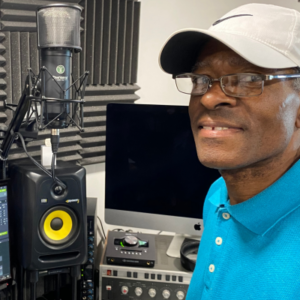Ray Parker Jr. was the third guitarist to join Motown’s session musicians in the later years. He was born in Detroit in 1954 and took up the clarinet at the age of six. He was educated at Cass Technical High School, Northwestern High School and Lawrence Institute of Technology. His route to Studio A was similar to Melvin Ragin’s; he was spotted by Norman Whitfield at the Twenty Grand Club. The leader of the Twenty Grand band was Hamilton Bohannon, who had invited Parker to sit in, having heard Parker playing at another club. Parker was just fifteen years old! He was young but he was good. At first, Whitfield was reluctant to bring such a young musician to Motown, but he later relented and gave Parker the chance to work with Smokey Robinson and Marvin Gaye in the studio. Parker also joined the Spinners’ touring band.

In 1972, Parker played guitar on “Maybe Your Baby” from Stevie Wonder’s album “Talking Book” and on Marvin Gaye’s single “You’re The Man”. That same year, he was also chosen to play lead guitar in Stevie Wonder’s touring band when Stevie Wonder opened for the Rolling Stones’ American tour.

Holland, Dozier , Holland were also always on the look-out for young musicians with talent. They also invited Parker (and Wah Wah Watson too!) into their studio to work with their top acts. Parker’s first credit for the H-D-H labels came in 1971, when he played on the recording of Honey Cone’s album “Soulful Tapestry” on Hot Wax. Parker went on to work with the Supremes, Aretha Franklin, Deniece Williams, Barry White, Bill Withers, the Temptations, Gladys Knight & the Pips, Diana Ross and many other star performers.

He was always interested in writing his own songs. While he was at Motown, he took the opportunity to work on an idea with help from Marvin Gaye, and later became adept as a songwriter. His first big hit was “You Got The Love”, which he co-wrote with Chaka Khan, the lead singer of the group Rufus, who in 1974 took the song to number one on the Billboard R&B Singles Chart and number eleven on the Billboard Hot 100 Singles Chart. His songs were also picked up by many later artists, including Deniece Williams and Diana Ross.
He formed the group Raydio in 1977, with whom he had several big hits including “Jack and Jill” from the album “Raydio” (1978) and “You Can’t Change That” (1979). The two singles and the album all entered the top ten and achieved gold certification from the RIAA. The next three albums also sold over a million copies.

Ray Parker Jr. live at the Montreux Jazz Festival 2009
Photo: Ueli Frey – www.drjazz.ch (Wikimedia Commons)
His biggest success came as a solo artist in 1984, when he wrote and performed the theme tune to the film Ghostbusters. The single spent three weeks at number one on the Billboard Hot 100 Singles Chart and also reached number two on the Official UK Pop Singles Chart. The credits show his talent and versatility: lead vocals, electric guitars, Korg Poly-61, Roland Jupiter-6 synthesizers, Roland MSQ700 sequencer, and Linn Drum programming.
The final point of significance was Parker’s contribution to the popularity of music videos. He recognised the potential of these mini-films at a time when few Black artists were making them and engaged the services of West Coast producer Thom Eubank to make videos for several of the tracks on Raydio’s first album for Arista Records. Later, the Ghostbusters video added weight to the success of the film and the single.

Ray Monette
Ray Monette (born in 1946) was the fourth guitarist added during the later years to the roster of studio musicians at Motown. His first sessions were probably in 1967, but they were few in number, as he was also working at other studios and playing live with his band the Abstract Reality.

In 1969 he was a founder member of Scorpion, along with Mike Campbell, Bob Babbitt and Andrew Smith.

In 1970, he played guitar on Funkadelic’s Westbound single “I Got A Thing, Everybody’s Got A Thing”. In 1971, he played on the album “Stoney & Meatloaf”, released on Motown’s new subsidiary Rare Earth Records, then on the album “Evolution” recorded by Dennis Coffey & the Detroit Guitar Band for Sussex Records, before he decided to join the group Rare Earth later in the year.


















